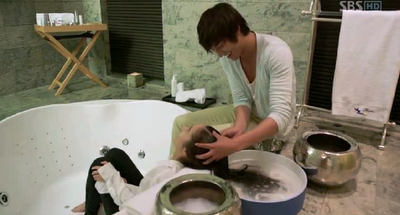1. Beginnings, middles, and ends.
2. Love stories get to be the true stars of the show.
3. Two words: flower boys.
 |
| Is that a gun, or are you just happy to see me? |
Toughest Kdrama female leads
1. Kim Hang Ah, King 2 Hearts. Need some bad-guy butt kicked? Your mother being held
hostage by a psycho with a thing for the pointier kinds of dental equipment?
Stuck in the middle of an international incident with a loaded gun pointed at
your head? Kim Hang Ah is the one to call.
2. Hwang Jin Yi, Hwang Jin Yi. She lived her life for art in the face of seemingly insurmountable
obstacles, even going so far as to eschew true love in favor of dancing. No man
ever got the better of her—although, interestingly, some women did.
3. Na Bo Ri, Hello, My Teacher. She may have been bumbling, but Bo Ri would do
anything within her power (and a number of things that weren’t) to protect her
students.
 |
| Nothing to see here, folks. |
Kdrama couples with no chemistry whatsoever
1. Eun Sung and Woo Han, Shining Inheritance. I would say these two seemed more like brother and
sister than lovers, but I’ve never seen siblings so visibly uncomfortable
around each other.
2. Young In and Seung Hyo, Who Are You? Your dad, that’s who, and it shows every time the
viewer looks at him.
3. Jan Di and Joon Pyo, Boys before Flowers. It’s just as well that these two had no
chemistry—this spectacularly cracktacular drama needed a flaw or two.
 |
| Lo, it is the single most heavenly kiss in all of Korean drama. |
Kdrama couples with Nobel-Prize-level chemistry
1. Eun Chan and Han Gyul, Coffee Prince. If life were ever-so-slightly more prone to magical
realism, the heat between these two would actually cause televisions to melt.
2. Byung Hee and Chul Su, What’s Up, Fox. He always looks as if he’d like to eat her alive—in a
good way.
3. Hee Jin and Boong Do, Queen In-Hyun’s Man. You know, maybe he really was a player all along:
Kisses that hot take practice. And spawn real relationships, it seems.
 |
| Ah, young love in all its splendor. |
Kdrama bromances that should have been consummated
1. Yeo-Rim and Gael-Oh, Sungkyunkwan Scandal. The show never dared to make the romance in this bromance happen, but I suspect the
imaginations of many viewers did. Sweet, funny, and supportive of each other’s
quirks, I would have liked them even better than this drama’s main couple if
they’d gotten together. (Above image borrowed from A Bag’s Life.)
2. Dong Joo and Ma Roo, Can You Hear My Heart? Their relationship was far and away the best thing
about this show, and they spent half of its running time rolling around in bed
together anyway. If only a little kissing had been thrown into the bargain, my
enjoyment of this drama would have skyrocketed.
3. Lee Gak and Tae Moo, Rooftop Prince. This edgy, love-hate relationship would have been
even edgier and love-hatier if they’d just given in to (the audience’s) baser
desires and made out instead of playing all that squash.
 |
| Hmm...where have I seen a Kdrama kiss shot in front of a similar background? |
More things I love about Kdrama romances
1. Hot kisses. Contrary to common wisdom, there are smoking hot Kdrama kisses out there—and in some ways they’re all the better because they’re so very rare.
2. Reincarnation talk. The deck might be stacked against the
lovers in this lifetime, but it kills me when they’re already hopeful for the
next.
3. The back hug. Most Kdrama front hugs feature stick-stiff
girls looking like they’re mentally tallying an upcoming dry-cleaning bill. The
back hug is a pure, nonsexual act of love and comfort in which the she gets to
take control.
Incredibly horrible things a Kdrama character has done to
his or her lover (that the show expects you to forgive without batting an
eyelash)
1. Attempted rape on a hotel room bed. She was visibly
terrified by his use of brute force one minute and confessing her love for him
the next? Ick.
2. With the help of the second male lead, she convinced her
soulmate that she’d died—and let him believe it for years. That dreamy surprise
meeting in the final scene should have involved a slap and some screaming, not
loving, dewy-eyed glances.
3. Trying to strangle the female lead through the bars of
his prison cell. Clearly this was traumatic for all involved, especially the
actress: the scene must have taken several attempts to film, because from the
very beginning you could already see the angry red marks on her neck.
(Drama names for this section will be posted in the comments to avoid spoiling anyone.)
(Drama names for this section will be posted in the comments to avoid spoiling anyone.)
 |
| ::insert Jaws theme music here:: |
Kdrama places I want to visit
1. The place where Lie to Me’s finale was shot. Green waters, palm trees, volcanic rocks: even
without a dreamy male lead, this is a place where I’d like to spend some time.
2. Heaven, Earth, and Man, the restaurant in Kimchi
Family. On dumpling soup and scallion
pancake day, please!
3. The giant Japanese bookstore in Someday. Bookstores make me happy on a visceral level, and
although it might be suspiciously close to hell on earth to be in one this
enormous and yet not be able to read a word, I’d be willing to give it a shot.
I love how books look, and feel, and smell, whatever language they’re written
in.
 |
| I would give him a huge tip, that’s for sure. |
Things every drama writer thinks Korean women want
1. For Lee Min Ho to wash her hair (which happened in both Personal
Preference and City Hunter)
2. To step between Park Shi Hoo and a deadly weapon (see both Family’s
Honor and Princess’s Man)
3. To wear couple rings with Park Yoochun (as in both Sungkyunkwan Scandal and Rooftop Prince)
 |
| It’s a miracle anyone survived the Joseon Dynasty, between all the royal poisonings and dangerous playground equipment. From The Princess's Man. |
Kdrama things that differ fundamentally from their
western counterparts
1. Swinging standing up. Really? I spent my entire
elementary school career being yelled at for doing this on the playground, and
it’s actually the traditional Korean approach to swings?
2. Rubbing your palms together. When an American does this,
it means we’re excited and looking forward to eating/seeing/doing something.
When a Korean does it, it means they’re begging. I guess the common theme is
that it’s expressing hope for something you want, but it’s bizarre that the
same gesture means something totally different in these two cultures.
3. Opening envelopes along a short edge, not the long one. I
can’t tell you how many times I’ve accidentally ripped through the top fold of
an envelope’s contents. Why don’t we Americans adopt this safer method for
opening mail?
 |
| I want to go to there (on a number of levels). |
Unspeakably wonderful things people overlook about Coffee
Prince
1. Props and set direction. From Eun Chan’s grown-up version
of a kid’s scheduling chart to Han Sung’s castle in the clouds, the things and
places associated with this drama’s characters have just as much to say about
who they are as the actors do.
2. Locations. Seoul has never looked more lush, green, and
welcoming. From the Coffee Prince shop
itself to the tree-lined hill leading from Han Sung’s house and the
checkerboard-pavement of the playground Yoo Joo frequents, this show was a gift
to Korea’s tourism board.
3. The clothes. In this case, the clothes really did make the
man…and the woman. Without their amazing wardrobes, Coffee Prince’s actors couldn’t have been so successful in
creating indelible characters. Han Gyul, the impeccably tailored ladies’ man;
Eun Chan, the everyday girl who happened to prefer baggy jeans to short skirts;
and Han Sung, the low-key, comfortable hipster. My favorite example of a
wardrobe choice that goes above and beyond the call of duty? On her big night
with Han Gyul, Eun Chan wore a boyish red polo shirt. When she returned from
Italy a year later, a different girl but still the same person, she wore a
girlier version of the very same red polo shirt.
 |
| My drama cave (note the Coffee Prince box set next to the cable box). |
1. Sony’s blu-ray player featuring Google TV. Most of the
“Smart TVs” they’re selling these days aren’t that smart at all: they allow you
to download apps, but rope off the rest of the Internet. Not so with this
set-top Google TV device. Using it, I can visit any website on my
television—and watch videos from Dramafever, Kimchidrama, Mysoju, and Dramacrazy. (Just not
Viki, for some bizarre reason.)
2. Logitech’s Squeezebox radio. It uses wireless Internet to
access radio stations anywhere in the world—including Seoul. (And Jeju,
Teajeon, Ulsan, Cheonju, Gangneung, Kwangju, and Pusan...)
3. A Dramafever premium membership. Always reliable, always
fast, and always decently subbed, Dramafever is worth every penny they charge.
(And a many more, actually.) My membership predates the recent price hike, so a
year of Kdrama is costing me about a third of one month’s cable bill. The only changes I could hope for would be a bit more coverage of new dramas (A Wife's Credentials, wherefore art thou?) and a stronger backlist of old shows.
The most popular Google searches that land people on this blog
1. Gong Yoo girlfriend. Yup. I definitely have the lowdown on that.... Or not, other than sometimes wishing it were me. (And then realizing I could probably only think of ways to keep him entertained for an hour or so before he would want to go do something athletic, and I would want to re-enact scenes from Coffee Prince. Which, it goes without saying, would be awkward.)
2. Family’s Honor review. I guess nobody else wrote much about this, so I’m toward the top of the search pile.
3. Painter of the Wind. Once again, hardly anyone is still writing about this show, but I can’t shut up about it. (And to the person who searched for “Painter of the Wind” “Incest”: They’re not related by blood, so it doesn’t count!)
The most popular Google searches that land people on this blog
1. Gong Yoo girlfriend. Yup. I definitely have the lowdown on that.... Or not, other than sometimes wishing it were me. (And then realizing I could probably only think of ways to keep him entertained for an hour or so before he would want to go do something athletic, and I would want to re-enact scenes from Coffee Prince. Which, it goes without saying, would be awkward.)
2. Family’s Honor review. I guess nobody else wrote much about this, so I’m toward the top of the search pile.
3. Painter of the Wind. Once again, hardly anyone is still writing about this show, but I can’t shut up about it. (And to the person who searched for “Painter of the Wind” “Incest”: They’re not related by blood, so it doesn’t count!)









